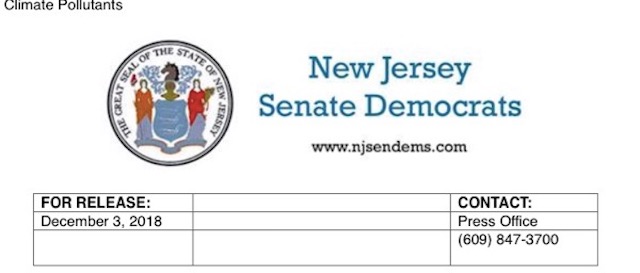After 12 Months In Office, Murphy DEP Proposes First Regulation, And It Is Awful
Several Red Flags In Stormwater Rule Proposal Reflect Continuity With Christie DEP Policy
Proposal Would Codify Christie DEP Rollback of C1 Steam Buffer Protections
Proposal ignores climate change
[Update – The Federal Emergency Management Agency (FEMA) agrees with our criticism, see:
On December 3, 2018, the Murphy DEP finally proposed its first regulation, after 12 months in power.
That is a record low number of regulatory proposals by any prior DEP.
The proposal is a major rule that makes significant policy and regulatory changes and will have significant negative impacts on development, water quality, flooding and DEP review of major projects, like proposed pipelines crossing NJ streams and urban “combined sewer overflow” systems.
The proposal was developed during the Christie DEP and reflects Christie DEP policy and priorities, not those stated by Gov. Murphy and DEP Commissioner McCabe, who have pledged to reverse the rollback course set by the Christie DEP.
The proposal has been a well kept secret thus far – it was not announced publicly by a DEP press release and there has been no news coverage of it thus far.
There are several major red flags that jump off the pages based on my preliminary review.
1. The proposal would codify the Christie DEP rollback of C1 steam buffer protections
Despite huge controversy, strong public opposition, and a legislative veto of the Christie C1 rollbacks, the Murphy proposal openly admits it not only would codify the Christie DEP C1 stream buffer rollbacks which allow “encroachments” into steam buffers that were prohibited by prior rules, it also fails to repeal and replace them with the original or more stringent regulatory protections:
The Department additionally proposes to update the existing reference to new encroachments in the special water resource protection area (SWRPA). The SWRPA was a 300-foot wide area adjacent to each side of water bodies designated as Category One waters pursuant to the Surface Water Quality Standards, N.J.A.C. 7:9B, and their associated perennial or intermittent streams that drained into or upstream of the Category One waters, which was intended to prevent adverse impacts resulting from stormwater runoff to Category One waters. As the Flood Hazard Area Control Act (FHACA) Rules also established a 300-foot riparian zone along Category One waters and a slightly different set of tributaries, in 2016, the Department deleted provisions related to the SWRPA from the Stormwater Management rules and incorporated new standards into the similar 300-foot riparian zone in the FHACA Rules in order to create a 300-foot buffer with uniform standards applicable to a uniform set of surface waters (see 47 N.J.R. 1041(a); 48 N.J.R. 1067(a)). To reflect this change, reference to the SWRPA is proposed to be replaced with reference to the 300-foot riparian zone contained in the FHACA Rules at N.J.A.C. 7:13-4.1(c)1. While protections previously provided to SWRPAs under the StormwaterManagement rules were incorporated into the FHACA Rules’ 300-foot riparian zone, local stormwater control ordinances may still include the SWRPA provisions or similar near-stream protected areas along Category One waters. Accordingly, in addition to reference to the FHACA Rules’ 300-foot riparian zone, it is also necessary to include new encroachments into 300-foot near-stream protected areas as an impact to be considered when determining if the grandfathering is still valid. Since the term SWRPA is no longer used in the Stormwater Management rules, it would be confusing to continue to use that term in N.J.A.C. 7:8-1.6(e). Accordingly, reference to 300-foot near-stream protected areas is proposed to be added at recodified N.J.A.C. 7:8-1.6(e)6 to reflect the similar protections that continue to be included in some municipal ordinances, regardless of what they may be referred to as in the particular ordinance. (p.48-49)
This is shameful – even the Legislature voted to veto the C1 buffer rollbacks as inconsistent with legislative intent.
There are several additional Christie DEP rollbacks that should have been repealed but were codified or ignored in the proposal. More to come about that as I conduct a more in depth review.
2. The proposal virtually ignores climate change
There are no new policies and regulatory standards to address current and projected impacts of climate change, including sea level rise, storm surge, increased rainfall frequency and intensity, drought, and heat waves and urban heat island effects – Or the need for carbon sequestration in soils and forests.
In fact, climate is mentioned exactly once, parenthetically, in the complex 169 page proposal, as an aside in a single sentence that makes a conclusion, with no supporting data. The DEP just threw it in there at the last minute:
Furthermore, the benefits of green infrastructure discussed in this notice of proposal help to improve community’s resiliency to the effects of climate change.
This is reckless and irresponsible.
3. The proposal is the result of the Christie DEP “by invitation only” Stakeholder process
The Christie DEP embarked on a “by invitation only” Stakeholder process that was not only dominated by business, industry, and development interests, but it also shut out critics and aggressive environmental advocates.
Gov. Christie issued Executive Order #2 to provide “regulatory relief” and make DEP rules, among other things, subject to “pre-proposal” review by business interests to avoid strict regulations and provide “advance notice” to allow special interests to intervene behind the scenes and block and weaken DEP rules. EO#2 explicitly seeks “to prevent unworkable, overly-proscriptive or ill-advised rules from being adopted.”
The Murphy DEP now embraces the policies of EO#2 and implements the work product of that process.
Stakeholder Engagement
The Department developed the proposed new rules, repeals, and amendments with extensive input from a broad range of stakeholders. Stakeholders included representatives from environmental groups, developers, academia, municipalities, counties, regional agencies, and consultants, as well as representatives from the New Jersey Department of Agriculture, the New Jersey Department of Transportation, and the New Jersey Department of Community Affairs.
The Department held stakeholder meetings in 2014, to discuss changes proposed in this rulemaking, including the proposed change to replace nonstructural stormwater management strategies with specific strategies from the New Jersey Stormwater Best Management Practice (BMP) Manual. The Department held three stakeholder meetings in November 2016, to discuss many of the proposed changes, including green infrastructure as a replacement for nonstructural strategies and changes that impact communities with combined sewer systems. Changes pertaining to motor vehicle surface and averaging compliance across multiple drainage areas were stakeholdered in 2011 and 2012.
The Department held a stakeholder meeting in June 2017, to understand stakeholders’ perspectives on whether there are site specific constraints that would prevent the use of green infrastructure BMPs. Stakeholders generally acknowledged that there may be cases of site constraints that cannot be overcome, but that the only condition for allowing utilization of non-green infrastructure BMPs should be for technical infeasibility. Stakeholders suggested requiring applicants to perform an alternatives analysis demonstrating that each green infrastructure BMP is technically infeasible for each drainage area, if the applicant seeks to use non-green infrastructure BMPs. Most stakeholders further expressed that cost should neither be considered in the alternatives analysis, nor factored into the decision whether to permit the use of non-green infrastructure BMPs. Stakeholders suggested a grandfathering provision allowing stormwater management designs already submitted to review agencies before the effective date of the rule to be reviewed under the rules in effect when the designs were submitted. Input received during the stakeholder process has been considered by the Department in formulating the amendments, new rules, and repeals proposed below.
The proposal makes some vague allusion to future stakeholder discussions – but that is ass backwards and puts the rollback cart before the more stringent new rules horse. It is not only bad public policy, but political malpractice to adopt a prior administration’s rollbacks while promising future improvements.
During this past stakeholder process, stakeholders expressed an interest in discussing issues beyond those addressed in this rulemaking. The Department is committed to continuing to hear andtake into consideration stakeholders’ perspectives on stormwater management issues. Therefore, the Department will hold additional stakeholder discussions to evaluate further potential future changes to N.J.A.C. 7:8 that are not part of this rulemaking and to the New Jersey Stormwater BMP Manual. Additionally, the Department plans to seek input on new efforts related to training and guidance. (p.5-7)
4. The proposal repeals prior regulatory mandates and replaces them by a slogan
“Green infrastructure” is more of a slogan than a policy and science based enforceable regulation, much like “smart growth”, “sustainable development”, “resilience”, and “environmental justice”.
The Department held three stakeholder meetings in November 2016, to discuss many of the proposed changes, including green infrastructure as a replacement for nonstructural strategies and changes that impact communities with combined sewer systems. …
The Department is proposing amendments to the Stormwater Management rules, N.J.A.C. 7:8, to replace the current requirement that major developments incorporate nonstructural stormwater management strategies to the “maximum extent practicable” to meet groundwater recharge standards, stormwater runoff quantity standards, and stormwater runoff quality standards, with a requirement that green infrastructure be utilized to meet these same standards.
The current “maximum extent practicable” mandate was poorly implemented by a point system that was over-ruled by the Courts, but it should have been strengthened, not abandoned and repealed. Here’s DEP’s “excuse” for that:
As the Department began to implement the nonstructural strategies in the Stormwater Management rules, the Department observed that accurate assessment of whether nonstructural strategies proposed to be incorporated into a particular project satisfied therules’ requirement that such strategies be utilized to the “maximum extent practicable” was difficult, with the ultimate determination involving a measure of subjectivity.
Green infrastructure is an unenforceable slogan – as a general policy thrust, it may be OK, but not when it is used to replace enforceable technical requirements. And it too “involves a measure of subjectivity”.
Here’s is DEP’s justification claim:
The use of green infrastructure BMPs, such as pervious paving, infiltration basins, and bioretention systems, will more effectively achieve the Department’s goals under the existing rules of reducing stormwater runoff volume, reducing erosion, encouraging infiltration and groundwater recharge, and of maintaining, or reproducing as closely as possible, the natural hydrologic cycle and minimizing the discharge of stormwater-related pollutants, such as TSS and nutrients.
There is no NJ specific data or science in the proposal to support that claim or that green infrastructure will be as protective as the current requirements it replaces.
More to follow.
5. The proposal reflects the Christie – Martin DEP regulatory “alignment” policy
A major initiative of the Christie Bob Martin DEP was to “align” various regulations to make it cheaper, easier and more certain for business to get DEP permits.
Alignment may sound good, but it lacks any scientific basis and conflicts with laws.
For example, the Legislature has mandated that DEP regulations in the environmentally sensitive Highlands and the Pinelands must be stricter than those in the rest of the state. Alignment makes no sense and violates the law.
Here’s The Murphy McCabe DEP justification:
To align the Stormwater Management rules with the new WQMP rules, the Department proposes to update various references to the WQMP rules…. (p.85)
The Department is additionally proposing minor amendments to provisions in the Coastal Zone Management Rules, the Freshwater Wetlands Protection Act Rules, the Flood Hazard Area Control Act Rules, the New Jersey Pollutant Discharge Elimination System rules, and the Highlands Water Protection and Planning Act Rules in order to update cross-references and incorporate other changes consistent with the proposed amendments to the Stormwater Management rules.
Despite the fact that back in 2002, the McGreevey – Campbell DEP sought a failed “Big Map” regulatory strategy to distinguish regulatory requirements based on location and environmental sensitivity, the concept remains sound and is actually mandated by law.
Location based regulation is also the foundation of the policy and planning area framework of the totally ignored NJ State Plan.
Instead of advancing that concept and complying with law, Murphy – McCabe parrot Christie policy.
6. The proposal has many loopholes and a broad “grandfathering provision”
The proposal would exempt many projects from so called new “green infrastructure” requirements:
The Department is proposing several amendments to N.J.A.C. 7:8-1.6 to provide a modified form of “grandfathering” that would be applicable to the changes being proposed at this time. In recognition that the proposed amendments, including the proposed amendment to require utilization of green infrastructure with very limited exception, could require significant redesign of projects that had similarly progressed in reliance on the existing rule requirements, the Department proposes to revise the dates that had been incorporated to provide limited“grandfathering” at N.J.A.C. 7:8-1.6(b) to reflect that major development qualifying for the exception will be subject to the requirements of the rules in effect one day before the operative date of this rulemaking (with the actual date one day prior to the date one year after publication of the notice of adoption in the New Jersey Register to be incorporated into the rule).
7. The proposal allows “mitigation”, “averaging”, “variances” and watershed-wide (HUC-14) compliance demonstration to escape enforceable requirements
There are many provisions in the proposal that let developers off the hook from various technical requirements at a site specific level, including the highly touted “green infrastructure” BMP’s.
A full discussion is beyond the scope of this post and will be addressed in future posts
8. The proposal repeals current water quality, stormwater volume, and groundwater recharge requirements
In addition, the proposal would allow “mitigation” to provide an exemption for nutrient and stormwater runoff water quality standards.
A full discussion is beyond the scope of this post and will be addressed in future posts
9. The proposal lays the foundation for approval of controversial pipelines and fossil infrastructure
The public and anti-pipeline activists have finally begun to understand the regulatory framework for stopping pipelines and new gas power plants, including DEP water quality certificates. The issues were discussed in detail during the debate on prior Christie DEP rollbacks of DEP rules.
The proposal not only failed to address these crucial issues, it would repeal standards (e.g. Total Suspended Solids, TSS, nutrients) and codify major loopholes in current rules the make it difficult if not impossible for DEP to deny permits for pipelines.
A full discussion is beyond the scope of this post and will be addressed in future posts.
10. The proposal fails to close many known loopholes and correct flaws in existing rules
A full discussion is beyond the scope of this post and will be addressed in future posts.
This is just an overview. More to follow.



